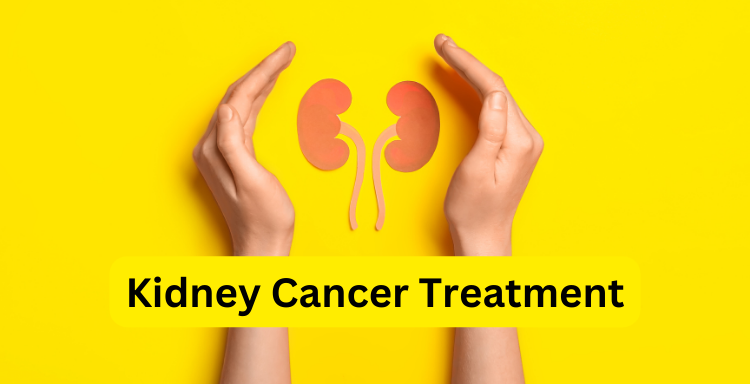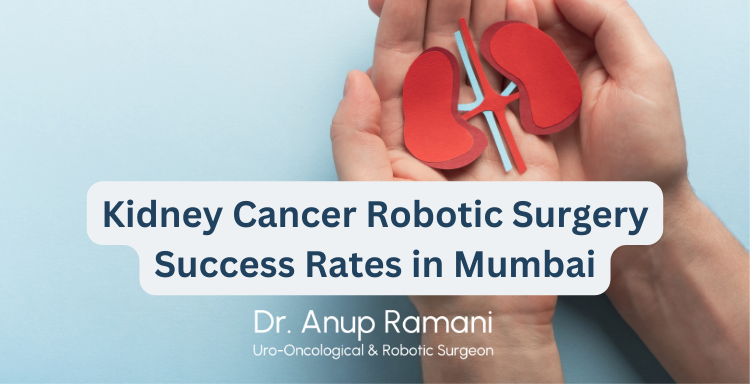Dr Anup Ramani @ Copyright 2024
By Dr. Anup Ramani
Mumbai, India’s financial capital, has emerged as a global leader in medical tourism, offering advanced treatments for complex medical conditions like kidney cancer. Renowned for its high success rates in robotic surgeries, Mumbai attracts international patients seeking cutting-edge care combined with affordability and efficiency.
The city’s prominence as a medical tourism hub is underpinned by its expertise in minimal invasive surgery for kidney cancer, including robotic radical nephrectomy and partial nephrectomy. This article explores Mumbai’s exceptional track record in treating kidney cancer, highlighting the benefits of choosing the city for medical care.
Understanding Kidney Cancer and Its Treatment Options
Kidney cancer affects the kidneys, which are vital organs responsible for filtering blood and producing urine. Early diagnosis and advanced surgical techniques are critical for improving patient outcomes. Treatment options for kidney cancer include:
- Robotic Radical Nephrectomy: Removal of the entire kidney, often used for large or aggressive tumors.
- Robotic Partial Nephrectomy: Also known as nephron-sparing surgery, this approach removes only the cancerous part of the kidney, preserving as much healthy tissue as possible.
- Minimal Invasive Surgery for Kidney Cancer: Laparoscopic or robotic methods that ensure precision, reduced recovery times, and minimal scarring.
Why Choose Mumbai for Kidney Cancer Surgery?
Mumbai is a leading destination for kidney cancer treatment in India, offering a unique combination of skilled surgeons, state-of-the-art facilities, and comprehensive patient care. Here’s why international patients prefer Mumbai:
- Expertise in Robotic Surgery for Kidney Cancer:
Mumbai boasts some of the best kidney cancer surgeons in India, specializing in robotic and minimal invasive techniques. - World-Class Hospitals:
The city’s hospitals are equipped with cutting-edge robotic systems like the Da Vinci surgical system, ensuring precision and safety. - Affordable Treatment:
The cost of kidney cancer surgery in Mumbai is significantly lower compared to Western countries, without compromising on quality. - Comprehensive Patient Support:
From visa assistance to follow-up care, Mumbai’s hospitals provide end-to-end support for international patients.

Success Rates of Kidney Cancer Robotic Surgery in Mumbai
The success of robotic surgery for kidney cancer in India, particularly in Mumbai, is attributed to the expertise of surgeons and advanced technology. Key factors include:
- High Precision:
Robotic systems enable surgeons to perform complex procedures with unparalleled accuracy, reducing complications and improving outcomes. - Reduced Recovery Time:
Patients undergoing minimal invasive surgery for kidney cancer in Mumbai typically experience quicker recovery compared to traditional surgery. - Preservation of Kidney Function:
For procedures like robotic partial nephrectomy, Mumbai’s specialists focus on preserving as much kidney function as possible, ensuring better quality of life post-surgery. - Global Standards:
Mumbai’s hospitals follow international protocols, maintaining high success rates and patient satisfaction.
Leading Hospitals for Kidney Cancer Surgery in Mumbai
Mumbai’s reputation as a hub for kidney cancer treatment in India is supported by its advanced healthcare facilities. The city is home to some of the best hospitals for kidney cancer surgery, offering:
- Dedicated Oncology Departments:
Multidisciplinary teams of oncologists, urologists, and nephrologists work together to provide personalized care. - Advanced Diagnostics:
Hospitals in Mumbai utilize state-of-the-art imaging and diagnostic tools for accurate staging and treatment planning. - Post-Surgical Care:
Comprehensive rehabilitation programs ensure smooth recovery and long-term follow-up.
Expert Kidney Cancer Surgeons in Mumbai
Mumbai is renowned for its pool of highly skilled specialists, including some of the best kidney cancer surgeons in India. These experts are trained in robotic and laparoscopic techniques, ensuring precise removal of tumors with minimal impact on surrounding tissues.
- Top Specialists:
The city has internationally trained kidney cancer surgeons, experienced in handling complex cases.

- Innovative Approaches:
Surgeons in Mumbai are adept at using the latest technologies for procedures like robotic surgery for kidney cancer, ensuring optimal outcomes.
Benefits of Robotic Surgery for Kidney Cancer
Robotic-assisted surgery has revolutionized the treatment of kidney cancer, offering several advantages over traditional methods:
- Enhanced Precision:
Robotic systems allow for greater dexterity and visualization, enabling surgeons to operate with unmatched accuracy. - Minimal Scarring:
Small incisions result in reduced scarring, less pain, and quicker recovery. - Shorter Hospital Stay:
Patients undergoing robotic procedures typically require less time in the hospital, reducing overall costs. - Lower Risk of Complications:
The minimal invasive nature of robotic surgery minimizes blood loss, infection risks, and post-operative complications.
Affordable Kidney Cancer Treatment in Mumbai
One of the major advantages of seeking kidney cancer surgery in Mumbai is its affordability. Patients from Western countries can save up to 70% on treatment costs, even when factoring in travel and accommodation expenses.
- Comprehensive Packages:
Mumbai hospitals offer all-inclusive packages covering diagnostics, surgery, hospital stay, and post-operative care. - No Compromise on Quality:
Despite lower costs, Mumbai maintains international standards in healthcare, making it a trusted choice for global patients.
Medical Tourism in Mumbai
Mumbai’s thriving medical tourism industry is a testament to its excellence in healthcare. For international patients, the city offers:
- Seamless Travel Arrangements:
Hospitals assist with visa processing, airport transfers, and accommodation. - Multilingual Support:
Language barriers are minimized with interpreters and multilingual staff. - Cultural Sensitivity:
Mumbai’s healthcare providers understand and respect diverse cultural needs, ensuring a comfortable experience for international patients.
International Patients
The success rates of kidney cancer surgery in Mumbai are reflected in the stories of countless international patients who have received life-changing care:
- Patient Testimonials:
Many patients report high satisfaction with the quality of care, surgical expertise, and overall experience in Mumbai. - Improved Outcomes:
Advanced treatments like robotic radical nephrectomy have enabled patients to resume normal activities quickly, with minimal side effects.
Why Mumbai Stands Out for Kidney Cancer Treatment
Mumbai’s edge over other medical tourism destinations lies in its unique combination of quality, affordability, and accessibility:
- Global Reputation:
The city is a recognized leader in kidney cancer treatment in India, attracting patients from across the globe. - Holistic Care:
From state-of-the-art technology to compassionate care, Mumbai hospitals deliver a comprehensive healthcare experience. - Focus on Innovation:
Mumbai continues to adopt the latest advancements in robotic surgery, ensuring world-class outcomes for kidney cancer patients.
Conclusion
Mumbai’s status as a medical tourism hub for kidney cancer treatment is well-deserved, thanks to its exceptional success rates in robotic and minimal invasive surgeries. With skilled surgeons, advanced technology, and affordable care, the city offers unparalleled healthcare solutions for international patients.
Whether you’re considering kidney cancer surgery in Mumbai or seeking innovative treatments like robotic partial nephrectomy, Mumbai ensures a seamless journey to recovery with excellent outcomes.
FAQs About Kidney Cancer Robotic Surgery
1. Why is robotic surgery preferred for kidney cancer treatment?
Robotic surgery offers precision, minimal scarring, faster recovery, and lower risk of complications compared to traditional methods.
2. What is the success rate of kidney cancer robotic surgery in Mumbai?
Success rates in Mumbai are among the highest globally, thanks to skilled surgeons and advanced technology.
3. How affordable is kidney cancer surgery in Mumbai?
Mumbai offers cost-effective treatment, with savings of up to 70% compared to Western countries, without compromising on quality.
4. Who are the best kidney cancer surgeons in Mumbai?
Mumbai is home to internationally trained specialists experienced in robotic and minimal invasive kidney cancer surgeries.
5. What makes Mumbai a top choice for medical tourism?
Mumbai combines world-class healthcare with affordability, accessibility, and comprehensive patient support, making it a preferred destination for international patients.
Read More Articles on Kidney Cancer Robotic Surgery
- How Robotic Surgery is Revolutionizing Kidney Cancer Treatment: A Look into the Future of Urologic Oncology
- Medical Tourism in Mumbai: A Hub for Uro-Oncology Treatments and Advanced Care
- Robotic Urological Surgery in Worli: A New Era of Precision Care with Dr. Anup Ramani
- Dr. Anup Ramani: Leading Uro-Oncologist and Pioneer in Robotic Surgery in India
- The Rise of Robotic Urology in Mumbai: A Game-Changer for Patient Care and Outcomes
About Author

Uro-Oncological & Robotic Surgeon
Dr. Anup Ramani is a robotic uro-oncological surgeon and an internationally recognized expert in robotic surgery for prostate, kidney and urinary bladder cancers. With more than two decades of robotic experience and 2,000+ robotic procedures, he brings unmatched precision and outcomes to complex uro-oncology cases. He is widely published in his field and is known for a personal, transparent approach-often spending over an hour in initial consultations to educate patients on its disease, surgery and recovery. His expertise spans prostate cancer treatment, kidney and bladder cancer surgery, adrenal gland surgery, kidney stone treatment, penile cancer surgery and enlarged prostate management. Dr. Ramani advocates the advantages of robotic surgery-magnified 3D vision, tremor-filtered precision, minimal scarring, lower blood loss and faster recovery-helping patients return to life sooner.
Table of Contents
Recent Blogs
Best Uro-Oncological surgeon
Specialist in India for Robotic Surgery
MCh, DNB, MS, DNB
Dr. Anup Ramani
CONTACT
Uro-Oncologist in India,
Best Robotic Surgeon for Uro Oncology Surgery
1407, One Lodha Place Next to World Towers Senapati Bapat Marg, Worli, Mumbai. 400013.
Dr Anup Ramani @ Copyright 2024 – Website Maintenance, SEO & GEO by Opal Infotech
- Partial penectomy is done in cases where glans and distal penis is involved with carcinoma.
- Partial penectomy is a type of organ-preserving surgery. Preservation of sexual and micturational function depends on the surgical dissection and reconstruction of residual urethra.
- Patients who develop stones in the kidney or ureter, often experience severe pain.
- This condition usually needs a procedure to remove the kidney stones.
- This procedure is called ureteroscopy and is performed very commonly.
- It does not require any cuts and hence it is painless.
- The procedure is performed with an endoscope inserted through the penis under spinal anesthesia.
- The scope is inserted through the penis into the kidney and stones are dissolved with a laser.
- The procedure takes about 40-50 minutes.
- A catheter (urine pipe) is kept after the procedure to drain the bladder. A stent is kept in the kidney at the same time.
- Patient is mobile and walking in the room the same evening.
- Hospital stay is one night and patient is discharged the next day after removal of the catheter.
- Patient has to come back after six weeks to remove the stent in the kidney.
- Patients can resume office a week after surgery and heavy activities like running, weight lifting, a month after the procedure.
- We offer fixed packages for this procedure which can be obtained by calling our helpline +91 9967666060.
- Men with an enlarged prostate, which is a normal ageing changes, often experiencing difficulty passing urine. This condition usually needs a procedure to trim the prostate and relieve the blockage.
- This procedure is called TURP and is performed very commonly.
- It does not require any cuts and hence it is painless.
- The procedure is performed with an endoscope inserted through the penis under spinal anaesthesia.
- The overgrown prostate is dissolved with a laser bloodlessly.
- The procedure takes about 40 minutes.
- A catheter (urine pipe) is kept after the procedure to drain the bladder.
- Patient is mobile and walking in the room the same evening.
- Hospital stay is two nights and patient is discharged with the catheter, which is removed after 4 days.
- Patients can resume office a week after surgery and heavy activities like running, weight lifting, a month after the procedure.
- We offer fixed packages for this procedure which can be obtained by calling our helpline +91 9967666060.
-
Robotic adrenalectomy is a sophisticated, complex surgery and it is very important that an experienced surgeon performs this surgery to avoid major complications.
-
Once the anesthesia is done, and patient positioned, three micro cuts (3mm each) are made in the patient’s abdomen.
-
The arms of the Da Vinci robot are connected to the cuts via ports (tubes).
-
Dr. Ramani then sits in the controlling console to perform the surgery.
-
On an average, a robotic adrenalectomy takes one hour.
-
The surgery is almost completely bloodless and there has never been any need to transfuse blood after surgery.
-
A urine catheter and bag to drain the bladder is inserted during surgery.
-
A tiny drain pipe may be inserted in the surgical side of the abdomen, connected to a bag.
-
Patient is kept nil-by-mouth the day of the surgery, with IV fluids. Sips of water are started the next day and solid food by day three.
-
The drain pipe, if kept, is removed in the room on day 2 after surgery.
-
The catheter is removed on day two after surgery.
-
Total hospital stay for robotic adrenalectomy is 4 nights (including night before surgery).
-
Post discharge, a doctor from the surgical team visits the patient at home/ hotel room once every day.
On the day of discharge, patient is totally self-sufficient. They are able to walk freely without any pain, dress themselves, shower, toilet and they do not need to hire any nurse or help at home. Almost all patients are back to work within 2 weeks of surgery.
Heavy activities like running, weight lifting can be resumed after a month
Follow up after an adrenalectomy is in the form of CT scans, once a year for 5 years.
Local patients usually meet Dr. Ramani after two weeks to discuss report.Outstation patients are counselled on a phone consultation.
- Dr. Ramani is one of the very few surgeons in India who has the expertise to perform a robotic surgery for bladder cancer, which includes removing the urinary bladder and reconstructing a new bladder robotically.
- Robotic radical cystectomy is an extremely sophisticated, complex surgery and it is very important that an experienced surgeon performs this surgery to avoid major complications.
- Once the anaesthesia is done, and patient positioned, six micro cuts (3mm each) are made in the patient’s abdomen.
- The arms of the Da Vinci robot are connected to the cuts via ports (tubes).
- Dr. Ramani then sits in the controlling console to perform the surgery.
- On an average, a robotic radical cystectomy with an ileal conduit takes 3-4 hours.
- The surgery is almost completely bloodless and there has never been any need to transfuse blood after surgery.
- A urine catheter and bag to drain the new bladder is inserted during surgery.
- Two tiny drain pipe in inserted in the surgical side of the abdomen, connected to a bag.
- Patient is kept nil-by-mouth for 4 days after surgery with IV supplementation of patient’s daily requirements of calories, fats, carbohydrates, proteins and electrolytes.
- The drain pipes are removed in the room on day 3-5 after surgery.
- Total hospital stay for radical cystectomy is 8 nights (including night before surgery).
- Post discharge, a doctor from the surgical team visits the patient at home/ hotel room once every day.
- On the day of discharge, patient is totally self-sufficient. They are able to walk freely without any pain, dress themselves, shower, toilet and they do not need to hire any nurse or help at home.
- Almost all patients are back to work within 6 weeks of surgery. Heavy activities like running, weight lifting can be resumed after two months.
Follow up after a radical a cystectomy is in the form of CT scans, once a year for 5 years.
Histopathology report: Local patients usually meet Dr. Ramani after two weeks to discuss report.
Outstation patients are counselled on a phone consult. Depending on the report, patient may or may not need chemotherapy after surgery.
If chemo is needed, patients may choose to get it done with a medical oncologist of their choice or avail the services of one of the four medical oncologists on our team.
- Robotic partial nephrectomy is a sophisticated, complex surgery and it is very important that an experienced surgeon performs this surgery to avoid major complications. Robotic radical (total) nephrectomy is
- relatively easier but still requires significant experience to consistently deliver results.
- Once the anaesthesia is done, and patient positioned, five micro cuts (3mm each) are made in the patient’s abdomen.
- The arms of the Da Vinci robot are connected to the cuts via ports (tubes).
- Dr. Ramani then sits in the controlling console to perform the surgery.
- On an average, a robotic radical nephrectomy takes one hour and a robotic partial nephrectomy takes about an hour and half.
- The surgery is almost completely bloodless and there has never been any need to transfuse blood after surgery.
- A urine catheter and bag to drain the bladder is inserted during surgery.
- A tiny drain pipe in inserted in the surgical side of the abdomen, connected to a bag.
- Patient is kept nil-by-mouth the day of the surgery, with IV fluids. Sips of water are started the next day and solid food by day three.
- The drain pipe is removed in the room on day 3 after surgery. The catheter is removed on day two after surgery.
- Total hospital stay for radical/partial nephrectomy is 4 nights (including night before surgery).
- Post discharge, a doctor from the surgical team visits the patient at home/ hotel room once every day.
- On the day of discharge, patient is totally self- sufficient.
- They are able to walk freely without any pain, dress themselves, shower, toilet and they do not need to hire any nurse or help at home.
- Almost all patients are back to work within 2-3 weeks of surgery.
- Heavy activities like running, weight lifting can be resumed after a month.
- Follow up after a radical/partial Nephrectomy is in the form of CT scans, once a year for 5 years.
- Local patients usually meet Dr. Ramani after two weeks to discuss report.
- Outstation patients are counselled on a phone consultation.







